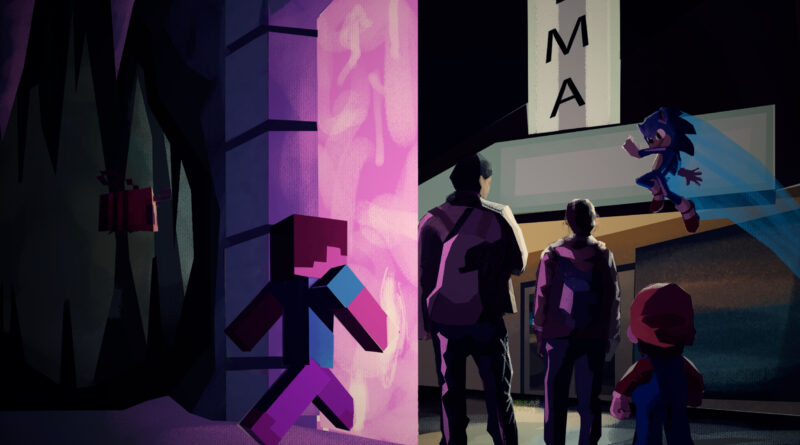From Console to Screen: The Struggles of Video Game Adaptations
Illustration by Nick Latham
Movies and TV shows based on video games seem to be all the rage these days. From “The Last of Us” to “A Minecraft Movie”, our screens have been full of video game adaptations. Though these films and television shows have been generally doing well lately, I think it’s notable to discuss the major challenges that creatives face when creating these video game-based films and television shows. Adapting this sort of media creates a few different challenges compared to adapting books or fairytales to the big screen.
To start, a huge factor in decision-making for films and television is the audience. The tricky thing is that when adapting a video game, you have an audience that’s all over the place causing creators to have to pick and choose which sections of the audience to cater to. Video games tend to be designed for a male “gamer bro” demographic. Though this isn’t the case for all of them, lots of video games fit a similar aesthetic to sell to this audience. When adapting to a film or TV series, the audience drastically changes. The story goes from needing to sell to people who own a PS4 to needing to cater to a more mainstream audience in order to make a profit. Creators have to choose whether to strictly stick to stories or designs to please an already developed fan base of a game, or make changes to try and appeal to a wider audience that may watch their product.
Creators face another added challenge because video games often come with a large group of people who associate nostalgia with them. In this way, video game adaptations face the same challenge as remakes since they have to battle with whether to please people’s nostalgia or create something new, risking severely upsetting people who grew up with this content. On the other hand, this nostalgia can be a huge advantage to the movie or television show. The best example is the recent “A Minecraft Movie” which was an absolute box office hit. This movie heavily rode on people’s nostalgia and love for the video game. They even included easter eggs in the film that specifically appealed to long-time players of the game. This movie was lucky as/because it did not have an already established story that the movie had to be based on. The creators had a lot of freedom with what to do with the plot since the game is so open-ended. This made their creative choices much more open and left a lot less room for criticism over accuracy to the original game.
Furthermore, creators have to battle with the fact that video game plots are created and crafted to advance a player through a game where they have tasks to complete or missions to go on. That means that while a story might feel paced in a video game, it could translate to feel rushed in a movie or television format. There simply could not be enough story from a video game to fill a two-hour movie time slot or a season of a show. This means that writers either have to add to the story or change some things about it. This goes back to the fact that too much change from the original source material can upset a lot of people, making it yet again a difficult situation to be in for creators. I think one show that did this well was season one of “The Last of Us.” This can specifically be seen in episode three, where the writers of the show took a shortcut scene with little information and turned it into a beautiful, tear-jerker story. At the same time, “The Last of Us” in its new season has received a lot of backlash for straying too far from the game in its character choices, even though it still included scenes that are word-for-word the same from the game.
Though there are a lot of challenges in adapting this sort of media to the big screen, I do still feel that they are worth creating. It can be hard to be the person in charge of the important creative decisions for these adaptations, but these films and shows do bring the video game to a much wider audience, no matter what. In a conversation I was having recently with a friend, he spoke about how though these adaptations may have flaws, they still bring a lot more people back to the original game than ever before. He spoke about how he loved that people got to see why he loved a game so much, even if they were not typical video game players. It was a reminder that, nonetheless, these adaptations serve as a bridge, inviting new audiences into the world of gaming and giving longtime fans a new way to celebrate the stories they love.
